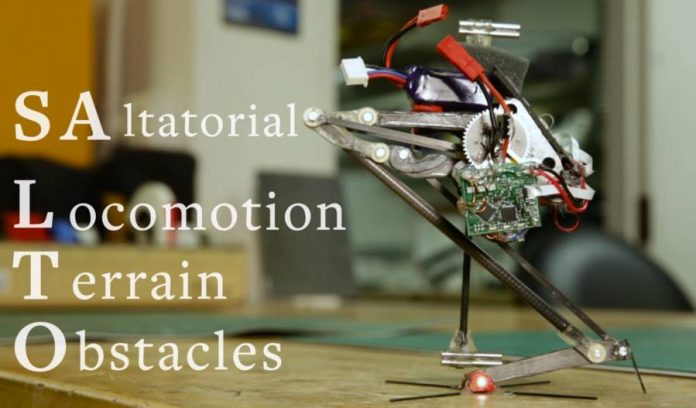
Duncan Haldane and a team of roboticists at Ron Fearing’s Biomimetic Milisystems Lab in UC Berkeley published a paper on Tuesday on Salto, the world’s “most vertically agile” robot.
Salto can leap over 3 feet into the air on a single jump, and researchers expect it can help on rescue missions in the future.
At a time when every big company and tech startup is looking to infuse its products and services with artificial intelligence, the Ph.D. candidates at UC Berkeley drew inspiration from nature itself to create a skilled jumping mech.
Salto’s uniqueness does not lie in the altitude it can reach on a single jump but on the versatility it could one day provide thanks to its locomotion abilities.
The UC Berkeley robot can perform successive jumps by using vertical surfaces as propelling platforms.
Galagos inspired the vertical “jumping agility metric”
Salto stands for Saltatorial Locomotion on Terrain Obstacles, and the team at UC Berkeley used the world’s most similar animal, the galago, as a model for the jumping capabilities of the robot.
Galagos can swiftly reach heights of nearly 30 feet through a series of jumps in record four seconds.
Determining what they truly wanted to achieve with Salto was essential in the development of the robot since the research team could have gone for faster, farther, or higher jumping robots depending on the task.
“Developing a metric to easily measure vertical agility was key to Salto’s design because it allowed us to rank animals by their jumping ability and then identify a species for inspiration,” Duncan Haldane said about the project.
UC Berkeley engineers created the vertical jumping agility metric for the task of classifying animals according to the height and frequency of their leaps. The variable uses meters per second as units.
Salto has a vertical jumping agility of 1.75 meters per second while the galago can reach 2.24 meters per second. The team replicated the energy-releasing mechanism that allows galagos to jump so high and quickly into the design of Salto.
The parkour robot could save lives in catastrophes
While Salto is not the highest jumping robot out there, it is indeed the best of its class. The UC Berkeley Ph.D. team led by Ronald Fearing may have on its hands the technology to help rescuers save more lives in the future.
At 100 grams and just under 30 cm tall, Salto represents a breakthrough in robotics and it has applications in everyday situations.
Meet Salto, our #parkour robot. One day, researchers hope to scale this up for search-and-rescue missions https://t.co/14CUeUnJuG pic.twitter.com/MxCFwkict6
— UC Berkeley (@UCBerkeley) December 6, 2016
A robot with Salto’s abilities enhanced to stand harsh conditions like extreme heat could help locate and rescue humans caught under debris in a fire, for example.
Salto’s vertical agility could be useful in several disaster situations, including earthquakes and natural disasters. Duncan Haldane, M. M. Plecnik, J. K. Yim, and Ron Fearing himself outline the potential uses of Salto on the first issue of the new journal Science Robotics.
Source: UC Berkeley











